Whether you’re starting in on some early holiday shopping, looking for a birthday gift or on the hunt for a “Just Because” gift, finding the right present for someone you love can be a challenge. When the person you’re shopping for has special needs, shopping for gifts is about more than just finding something they’ll like — it’s about finding a gift they can use and enjoy on their own regardless of their limitations.
Depending on their disability, people with functional needs — commonly referred to as special needs — may require special switch-activated toys or activities. Some individuals with a sensory processing disorder may have limitations as to which kinds of lights or noises they can enjoy in a toy. Or, they may be older and want to use the same electronics as their friends, but with modifications for their needs.
Wouldn’t it be nice if someone would just find the perfect gift and write your name on the card? We can’t do the shopping for you, but if you’re looking for gift ideas for a friend, student or family member with special needs, then you’ve come to the right place!
Our ultimate gift guide for kids and adults with disabilities is designed to give you lots of ideas for finding the best gifts to give people with disabilities, as well as some tips for showering them with love and care during any special holiday or celebration!
More Inclusive Toys Are Being Made
Before we start on specific suggestions, let’s take a few minutes to understand why purchasing the right toys for people with special needs is such a big deal. Although individuals with disabilities can use some mainstream toys, those toys often are not naturally adapted to their needs. For example, battery-operated toys typically come with a small switch to activate them.
A person with cerebral palsy or another physical limitation may not have the fine motor skills necessary to grip and move that tiny switch. For older teens and adults, a standard iPad may present a challenge because they can’t use the touch screen properly.
Another reason individuals with functional needs may require different toys and adaptive devices is because of unique ways of processing. Just as mainstream toys are designed to help children learn and grow, these individuals still need to learn and grow, but they need toys that take into account their struggles with paying attention, loud noises and bright lights.
In the past, mainstream toy manufacturers haven’t always produced toys to address certain physical and mental needs, so companies like Enabling Devices began making their own suitable alternatives. In many cases, their toys for special needs mimic those found in toy stores across the country.
They are designed with individuals with functional needs in mind, which include those with Autism Spectrum Disorder (ASD), physical disabilities or vision impairment. However, adapting them to use switches or large buttons where necessary and providing sensory experiences that help, rather than hinder, those with sensory sensitivities.
How to Find the Right Toy: Questions to Ask
Even when you’re looking at gifts specifically designed for individuals with special needs, it’s important to remember that not all toys are made for all types of needs. Consider the person you’re shopping for. What do they enjoy? What do they already have? What are their limitations or what accommodations do they need? Depending on your relationship with the person you’re shopping for, you may be able to narrow down gift options quickly. But if you’re struggling to find options, you can ask some questions to help you identify the right gift.
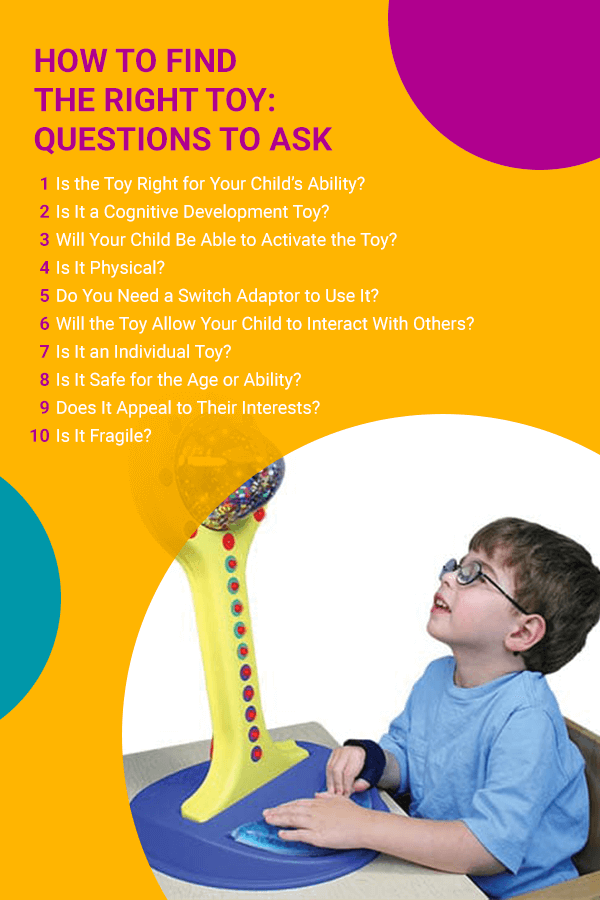
1. Is the Toy Right for Their Ability?
First, consider the person you’re shopping for. For instance, what you get a child with ASD may be different than what you buy for a teen wheelchair user. Individuals with ASD may benefit from sensory toys designed to calm and soothe, while an individual with a physical disability or limited mobility may benefit more from an activity designed to help make their world more accessible, such as a mount for their iPad.

2. Is It a Cognitive Development Toy?
Puzzles, board games, toys with simple instructions or repetitive actions will provide cognitive development opportunities for those who need them. If you’re shopping for an individual who has a physical disability but not a cognitive one, though, then a gift like this may not be the right one.
3. Will They Be Able to Activate the Toy?
Consider how the toy works. Given your child’s ability, will they be able to activate it themself? If not, they may become frustrated and set the toy aside in favor of something they can operate. Switch-activated toys and tools are a great option if you are shopping for a gift for someone who cannot operate smaller switches.
4. Is It Physical?
Does the gift you’re considering require physical effort to use? If so, can the individual you’re purchasing it for operate it given their mobility needs or limitations?
5. Do You Need a Switch Adaptor to Use It?
In some cases, an individual with special needs may not be able to operate mainstream toys because they cannot use the on-off switch that often accompanies battery-operated toys. Adapted toys allow individuals with special needs to interact with these toys by giving them a button to press or other alternatives for operating the toy with the use of a switch. Some toys and activities come with a switch adaptor, while others may be modified to add one.
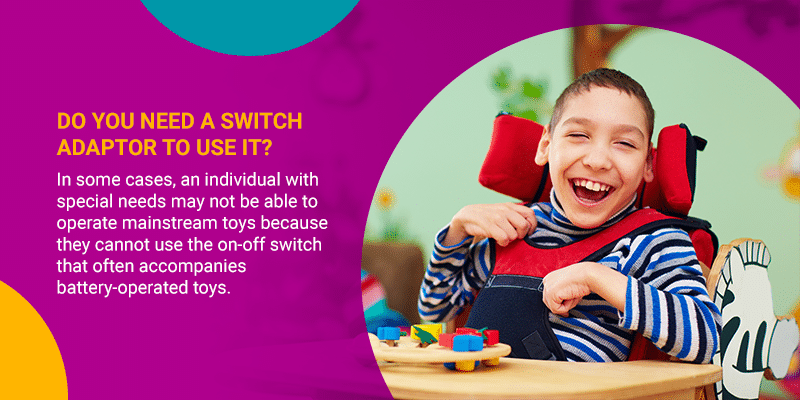
6. Will the Toy Allow Them to Interact With Others?
Among its many benefits, play allows children and adults of all abilities to interact with others. Educational toys for people with disabilities, as well as games, encourage interaction and communication with others. Such interaction can be beneficial toward encouraging social interaction and development.
7. Is It an Individual Toy?
In some cases, people with sensory processing disorders may benefit from toys and gifts that are calming and can be used alone, such as plush toys or fidget toys. In other cases, an individual may benefit from puzzles and games that help with mobility or cognitive development when there isn’t a parent, teacher or another child nearby to help.
8. Is It Safe for Their Actual and Developmental Age or Ability?
In this case, buying a gift for a person with functional needs is no different than buying a toy for any other child. Consider their age, but more importantly where they are in their development, to determine whether the gift you’re considering will be helpful or frustrating.
For example, a young child likely won’t be able to understand board games, and a teen or adult may not enjoy a stuffed animal or toy designed for a younger person. If you’re not sure whether an item is developmentally appropriate, it’s always a good idea to consult their parent or caregiver to get their opinion before you buy.
9. Does It Appeal to Their Interests?
Children and adults with special needs are individuals with unique interests and abilities. What appeals to one won’t necessarily appeal to another. Before you buy a gift, consider what you know about them. Do they enjoy sports? Music? Art? Computers? There are a wide variety of gift options for children, teens and adults with special needs, each tailored to a variety of interests.
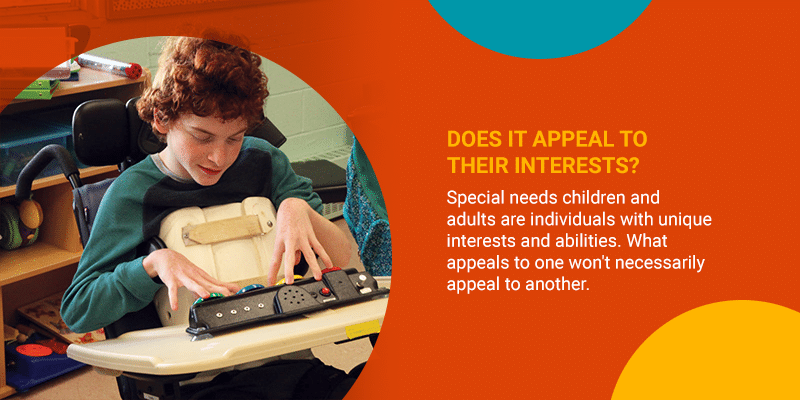
10. Is It Fragile?
Gifts that are fragile may be dropped and broken. It’s vital to make sure you purchase a quality product that will stand up to regular use.
Educational Toys and Guides
Play is how people learn about the world around them. It’s essential to both physical and mental development. This concept is no different for an individual with special needs. In fact, it can become even more important because of the ways it can help them cope with and adapt to their functional needs or limitations.
Are there specific educational toys for different needs?
The short answer is: Yes!
Depending on the needs of the person you’re shopping for, certain toys can provide comfort, stimulation and even physical activity. For example, individuals with ASD often benefit from sensory tools that play soothing music, fidget toys or other tactile processing toys such as a sensory pillow or stuffed animal.
A child with cerebral palsy, on the other hand, may benefit from toys that can be manipulated, such as kinetic sand, building or stacking sets or a set of basic musical instruments, such as one that includes percussion instruments like cymbals, a triangle and a tambourine.
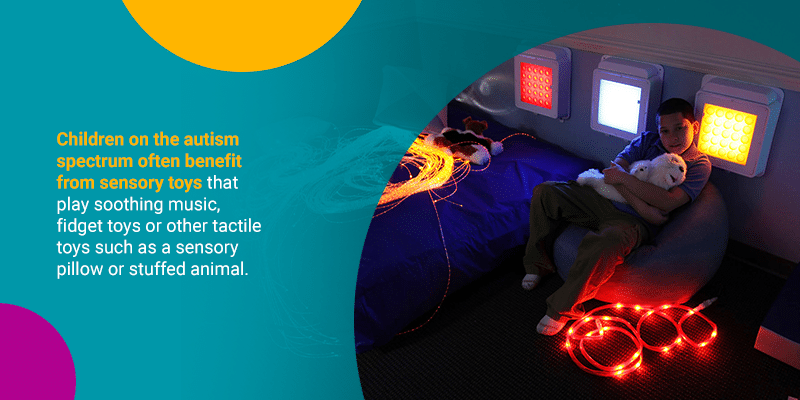
If you’re looking for just the right gift, Enabling Devices offers a variety of toys, sold both individually and as bundles. Our educational classroom kits also make great gifts for individuals of all actual and developmental ages and abilities. Some of our more popular options include:
1. Classroom Fidget Kit
The Classroom Fidget Kit is designed to help children and adults with ASD control their impulses and soothe themselves in the classroom, during therapy or at home. When they can control their impulses, it allows them to better focus and retain information, as well as self-soothe when they are overloaded because of a lot of noise and activity around them. Among the many items included in the kit are Sensory Stixx, Water Snakes, Squish Disks, Mini Koosh Balls and more, all inside a carrying case.
2. Creative Art Bundle
Perfect for the artist in your life, the Creative Art Bundle is a great way to build an at-home art studio and enjoy hours of fun for individuals of all abilities. The Creative Art Bundle includes swirl art, battery-operated scissors and a motorized squiggle wiggle writer pen. The swirl art painting machine and the scissors are both switch-adapted as well. These pieces can all be purchased individually, but this kit combines these great products to provide a creative outlet for any artist!
3. Quick Start Communication Kit
Designed for students with basic communication challenges, the Quick Start Communication Kit combines Enabling Devices’ most popular tools to help students become active and engaged in therapy or school, even when they have communication challenges that might otherwise hinder social interaction. But don’t be fooled! This kit doesn’t just benefit students in the classroom or therapy. The skills it helps to build extend into the home as well.
4. Sensory Discrimination Kit
If you’re looking for a gift for an individual whose special needs mean they need to develop their sensory awareness, the Sensory Discrimination Kit is a great option. This educational toy features eight different compartments, each with a unique material and texture. Users learn tactile discrimination skills as they feel the difference between various textures, including bumpy, sparkly, fuzzy, soft, hard, smooth and scratchy. This product can be helpful during sensory integration therapy or for assessing sensory discrimination skills.
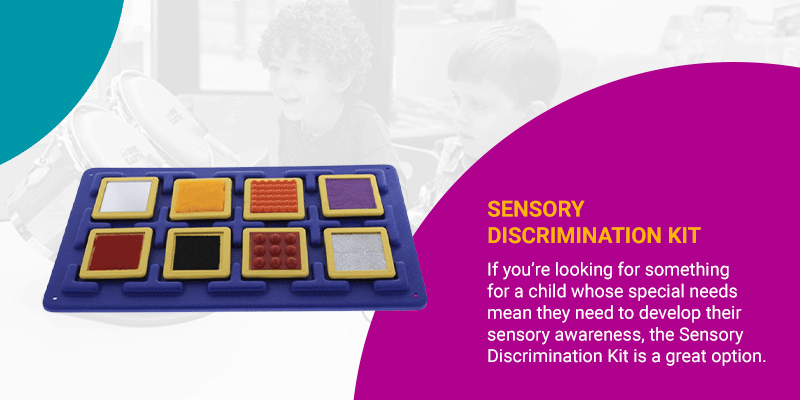
Best Presents for Wheelchair Users
Looking for the perfect presents for wheelchair users may at first seem to present a challenge, but provides a great opportunity to find heartfelt and useful items regardless of what functional needs the recipient has.
But before you run out and buy the first device you see, take a few minutes to think about the person you’re buying for. What will help them achieve their goals? Do they need something that will help improve their ability to engage in therapy, at home or in another social setting? Is there something that will allow them to participate in the same activities as their non-wheelchair-bound peers?
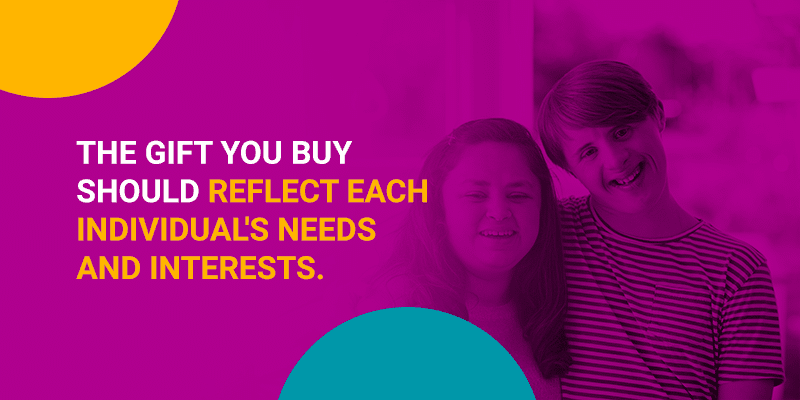
Wheelchair Attachments
Keeping the wheelchair comfortable and functional is important! Enabling Devices offers a variety of accessible wheelchair attachments, including the Easy Flex Mount, the Eye-Talk Bundle, the Clip Clamp, an iPad Mounting System and the Massaging Pillow. Each of these tools is designed to help wheelchair users perform daily tasks and maintain their comfort in their chair. Although each of them serves an exciting and unique purpose, part of the fun of choosing one of these as a gift is determining which attachment would be most beneficial to the person you’re buying it for. Their needs or limitations will determine how effective each item is, so before you buy it, stop and consider how it can and should be used.
Best Presents for Specific Needs
Depending on your relationship with the person you’re buying a gift for, you may already have an idea of what to purchase or you may not be sure where to start. As we’ve mentioned before, the gift you buy should reflect each individual’s needs and interests. However, there are some good gifts for children and adults with specific needs. Consider these suggestions if you’re not sure where to start looking!
1. Gift Ideas for Those With Cerebral Palsy
Wondering what to get a child or adult with cerebral palsy? As with those with ASD, there is a wide range of needs and abilities you’ll encounter with those who have cerebral palsy. In most cases, you’ll be looking for a gift that helps them develop gross and fine motor skills, as well as their communication skills. It should also stimulate them intellectually. So what kinds of gifts will do all of those things?
Some great gifts for individuals with cerebral palsy include stacking or building toys, especially those with larger pieces or blocks. These can help an individual with cerebral palsy practice their fine motor skills, but they are still large enough that they’re easy to grip.
Switch–adapted games and toys are also a great option since physical limitations may prevent someone with cerebral palsy from being able to operate switches on mass-market toys. Enabling Devices even makes a variety of switch–adapted art products for hours of creative play. Musical instruments or adapted electronics are also great options.
2. Gift Ideas for Those With Autism Spectrum Disorder
When it comes to figuring out a good gift for someone with ASD, it’s important to consider their developmental stage rather than their age alone. Think about their abilities and their limitations as you’re considering certain toys or gifts. As a general rule of thumb, soothing items such as weighted blankets, stuffed animals or a vibrating pillow can all be good options. If you’re looking for something they can play with, consider sensory toys such as a somatosensory tube, which emits soothing lights and vibrations.
Water toys, puzzles, light and movement projectors, ball pits and liquid motion toys are all other options when it comes to finding toys that encourage sensory stimulation while still providing a secure, calming experience.
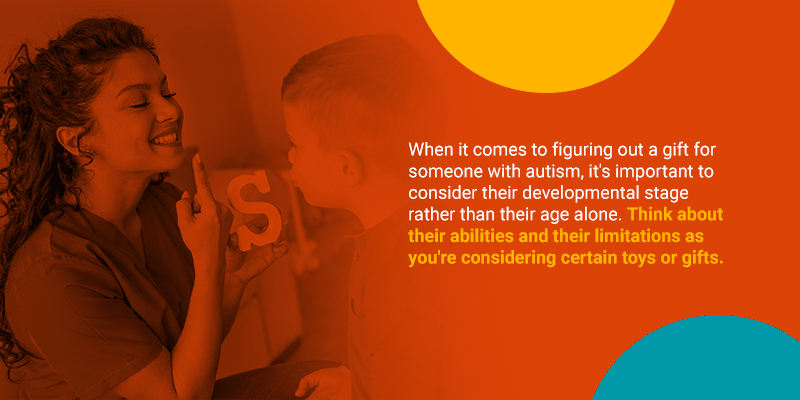
3. Gift Ideas for Those With Visual Impairment
One of our most popular toys and learning tools, the Visually and Hearing Impaired Activity Center has the same features as its original sibling, but its bright blue tactile plate, pull-ball and textured bright yellow oval plate make it accessible to users who are visually impaired. The Musical Light Box helps users with visual impairment identify shapes and objects, practice writing skills and create arts and crafts.
Sensory Gifts for Special Needs
Those with sensory differences process sounds, smells, sights, tastes and touch in unique ways. In some cases, they may be comforted by certain sounds, smells and sights. In fact, kids with different sensory needs tend to gravitate toward things they can touch and “fidget” with because the repetitive motions of touching, stroking or squeezing something help them to self-regulate and soothe when they’re otherwise unable to focus or stay calm.
In other cases, these same sensory experiences invoke feelings of agitation or fear and cause meltdowns or tantrums, especially in the case of loud noises, harsh smells or bright lights. When it comes to sensory gifts for people with disabilities, there are several different directions you can take.
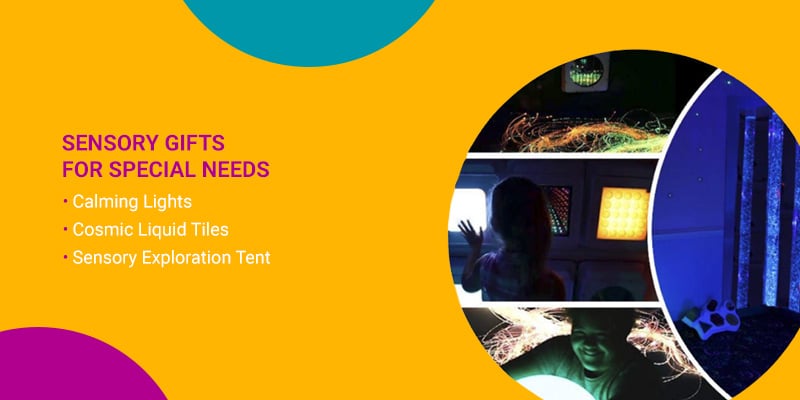
1. Calming Lights
Enabling Devices offers a variety of calming lights to be used on their own or included in a home, therapy or sensory space. Depending on the individual’s needs, they can provide a sense of calm or they can provide needed stimulation. Among our favorites are the LED Light Illuminators, which can be programmed to cycle through all the colors in the rainbow. The great thing about these lights is that you can adjust the level of brightness they project, as well as the speed at which they cycle through the colors.
2. Cosmic Liquid Tiles
Enabling Devices Cosmic Liquid Tiles encourages the improvement of gross motor skills. It also gives individuals with sensory processing disorders the opportunity to step, jump, dance or hop in the security of their own home. It’s also a great way to encourage physical activity in a child or adult who is unable or unwilling to spend much time outside.
3. Sensory Exploration Tent
This isn’t your average camping tent! The Sensory Exploration Tent is designed to provide positive sensory experiences in a safe, relaxing environment. The tent comes as part of a set that includes a weighted blanket, learning lamp, Gel lap pad and a variety of other soothing sensory items. The tent also has two openings, as well as a roof-top easy view screen that allows parents and caregivers to keep an eye on children or adults playing and relaxing inside.
4. Sensory Wall Panels
An interactive wall of various visual, auditory and tactile experiences excites users and supports their sensory awareness skills. Sensory Wall Panels are ideal for people with ASD or a sensory processing disorder who can benefit from discovery and play. With a wide range of options, including an infinity mirror, moving marbles, touch lights and musical fireworks, this gift is great for sensory stimulation. Enabling Devices Sensory Wall Panels also feature engaging colors and lights to promote calmness and interaction.
Why Puzzles Are Good for All
These days, puzzles aren’t just a box full of flat cardboard pieces waiting to be joined together. Enabling Devices offers a variety of puzzles designed for individuals with a variety of special needs. But why are puzzles such a great gift? Puzzles can help promote interactive learning, development of fine motor skills and even provide multi-sensory experiences. How is that possible? Puzzles can help children and adults with:
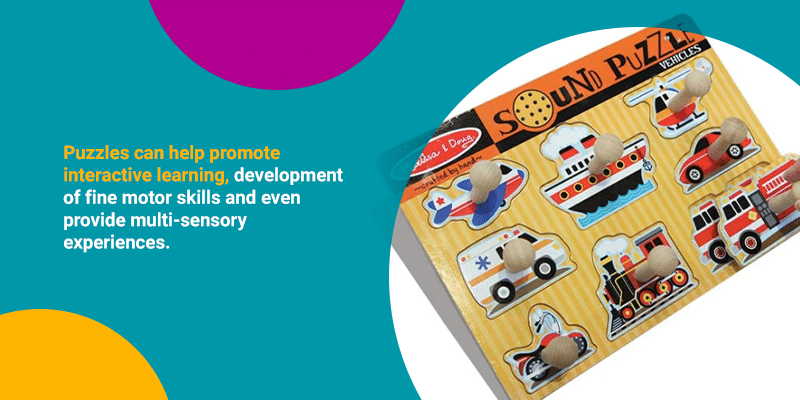
1. Sorting
Depending on the type of puzzle, the person putting it together — or taking it apart — will be required to sort pieces by color, shape and touch. Sorting the pieces correctly can help individuals engage and strategize to complete the task.
2. Attention Span
Putting together puzzles can help children and adults with ASD practice devoting their attention and focus on a specific topic or activity. Over time, as they begin to cultivate the ability to focus on one thing, they can attempt increasingly challenging puzzles.
3. Memory Improvement
Think of a puzzle as a tangible way to watch someone exercise their brain. As individuals learn to pay attention to what’s in front of them, they’ll begin to be able to focus on other things as well. Over time, they will learn to hear what their therapist or teacher is saying and retain the information for later.
4. Problem-Solving
Piecing together a puzzle is also a great way to help people of all actual and developmental ages and abilities practice their problem-solving skills. There is a lot of deductive reasoning that goes on when a person has to put something back together.
They have to follow clues and certain steps to arrive at the right answer — the completed puzzle — and they have to know how to backtrack or troubleshoot when they encounter obstacles. Puzzles provide a low-key, safe way to practice these skills they’ll need in school, work and the world around them.
5. Self-Esteem
It feels good when you see a completed puzzle. Regardless of what kind of puzzle it is or the skill level it requires, viewing a completed puzzle provides a sense of self-worth and accomplishment that makes individuals feel good about themselves. And when they feel good about themselves, they’ll feel more confident and able to handle other challenges they’re facing.
6. Fine Motor Skills
Your family member, friend or student can practice their fine motor skills when doing a puzzle by grasping and picking up each piece to place it in the correct spot. Handling the pieces is a great way to develop the muscles in the hands and wrists as they work carefully to fit the pieces together. Additionally, learning to manipulate the pieces to position them just right can help improve eye-hand coordination.
7. Socialization
Puzzles can be enjoyed individually, but they’re also fun to do with others. Individuals with functional needs can interact with peers and adults as they work together to complete the picture. This allows everyone involved to feel included in achieving their goal and encourages users to listen to one another. For example, you might guide them to look for blue pieces or prompt them to tell you which ones are corner pieces.
Visual and Light Toy Gifts
Visual and light toy gifts can be stimulating or calming — depending on the toy or item you’re considering. In some cases, soothing lights and lamps can create a calm atmosphere. They can be used in a sensory room or any space that is used to calm children or adults with sensory differences. Why does light have a calming effect? Soft lights in a variety of colors are soothing.
If you know someone with ASD or other unique sensory needs, lights can help them through a meltdown or decompress after being in a situation that left them feeling overloaded. Certain types of lamps can emit light in a rhythmic motion and this motion can also add to the calm.
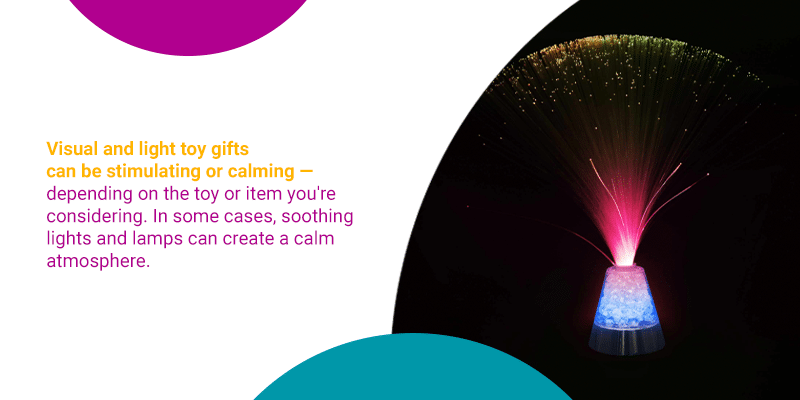
In other cases, lights can be used in sensory stimulation exercises designed to increase attention span, decrease boredom or practice a variety of sensory-motor skills. Among the visual and light toy gifts Enabling Devices sells, consider some of these favorite options:
- Spinning disco ball: The Disco Ball projects a kaleidoscope of colors on the wall or ceiling. It has a variety of uses, depending on the needs of the child or adult using it. It can provide a calming effect because of the soft lights it produces, or it can be used to help with increasing attention and color recognition.
- Sensory light: The Fiber Optic Sensory Light is another great addition to any sensory space. The switch-activated sensory light alternates between five different colors that cycle through the color-changing crystals in the base and up through the fiber optic spray at the top. This relaxing light can create a calming effect in any room, but it’s also a great tool for improving visual attention and teaching cause and effect.
- Motion lamp: If you’re looking for a light toy or visual gift, consider the Jellyfish Lamp. When you turn it on, incredibly lifelike jellyfish float and sway to the motion of the water inside. Besides providing calming lights and something interesting to look at, this lamp is designed to increase visual attention and learn cause and effect.
Communicator Gifts for Those With Special Needs
Communication Devices — also known as Augmentative and Alternative Communication (AAC) devices — are designed to help individuals express themselves in ways that don’t rely on verbal communication. There are a wide variety of devices available for all levels of needs, and they can be a great gift idea for speech or non-voice communicators.
Beginning communicators will enjoy telling jokes, greeting friends or singing songs with the simple, easy-to-use Big Talk communicator, while more advanced communicators will find new ways to express themselves with the Cheap Talk 8 – 6-Levels. This best-selling communicator has space to record 48 five-second messages on six levels. For those with verbal and visual limitations, the Adjustable Angle Sequencer w/ Switch offers 300 seconds of recording time, as well as a large switch identified by a set of LED lights at the center.
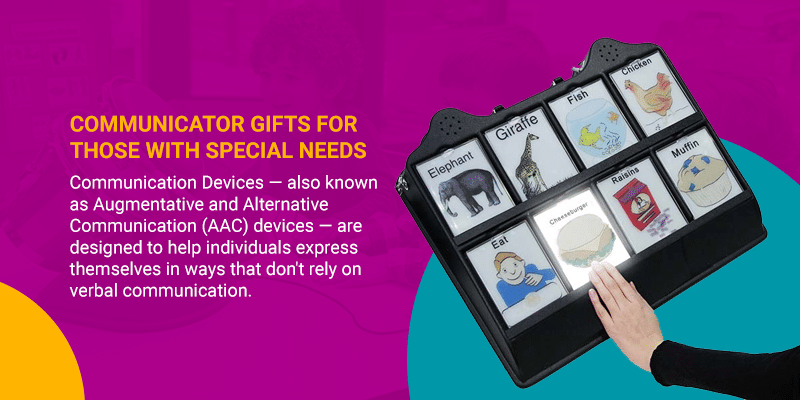
The Best Soft and Cuddly Toys for Special Needs
Plush toys are a great option for children and adults with special needs because they provide somatosensory stimulation. What does that mean? The somatosensory system is the body’s sensory system that registers touch — pressure, pain, vibration, temperature and movement.
Because these are all neurological impulses, in some cases, individuals may experience hypersensitivity or difficulty regulating these impulses. Having something soft and cuddly to hold is comforting, but the vibrations that they emit can also provide stimulation and relaxation when it’s needed most.
Some of Enabling Devices’ most beloved cuddly toys include the Vibrating Rabbit and Floppy Bunny. Just activate your capability switch, and Floppy hops and wiggles his nose. These plush toys are designed to improve tactile awareness and increase sensory stimulation, but they also serve to provide comfort and companionship to their owner.
Weighted toys can also be very soothing and engaging for anyone. Whether they’re on a long car ride or needing a bit of quiet time, the Cuddly Dog Weighted Lap Pad provides a grounding, calming sensation for many users. Individuals of any actual and developmental age can enjoy cuddling this five-pound weighted plush toy against their chest and experience comfort and sensory engagement.
Art Toys and Gifts
Art transcends age, stage and a variety of interests and abilities. It is a wonderful way for people to express themselves. It provides a creative and therapeutic outlet, as well as numerous educational opportunities.
If you’re looking for toys and gifts to ignite the spark of creativity or fan the flame, consider Enabling Devices’ Musical Swirl Art kit. Just pour the paint into the spinner, insert a piece of paper, and then activate your switch and watch as beautiful painted patterns and designs come to life before your eyes! While the machine is swirling the paint, it also plays music and multi-colored blinking lights to inspire artists and maintain the focus of the artist at work. If you’re looking for a practical benefit to this gift, it’s a great way to improve color recognition and listening skills!
Gifts for the Music Lover
Music can be a fun and soothing experience for those with special needs, so gift them their very own musical toy!
1. CD Player
Make all their favorite sounds accessible with the CD Boom Box, a switch-adapted device equipped with a CD player, AM/FM radio and cassette recorder.
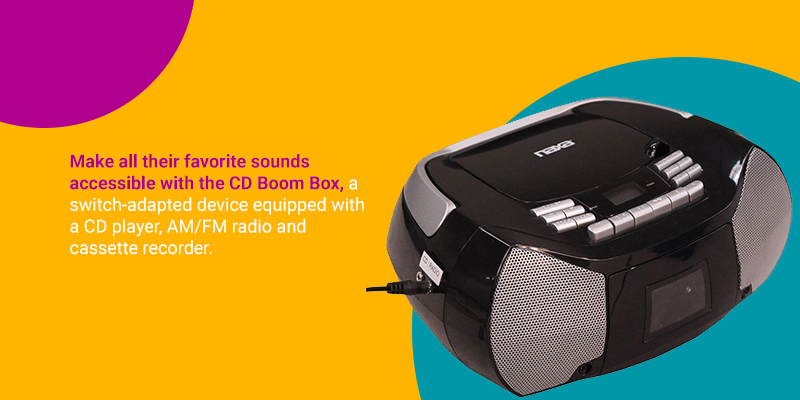
2. iPad Accessories
If they have an iPad, consider gifting them with some accessories to make listening to their favorite tunes easier than ever! Choose an iPad stylus designed to help make musical selections with your head, hand or mouth or gift them with one of our iPad mounts that holds their technology right where they need it.
3. Switch-Adapted Guitar
Some individuals may not be ready for a stereo or other electronic device but still enjoy musical activities. If this sounds like them, consider the B Woofer Guitar. Choose from several types of guitars and hear nearly 30 different tunes with this fun toy. This switch-adapted toy also offers eight different chord options so little musicians can make their own music when they’re done listening to music from others!
4. Five-in-One Drum Set
Everyone can rock out with Band Jam, the battery-operated drum set that features the sounds of five different percussion instruments, as well as flashing LED lights. This is a great way for your little musician to explore and learn about musical instruments, as well as develop their appreciation for the music around them.
5. Music Machine Set
If music performance is their thing, give them the Music Machine Set. This three-instrument set produces great sounds, providing hours of entertainment! An adapted toy like the Music Machine allows users to interact with instruments like cluster bells, a maraca and a tambourine with a drumstick.
They can use a switch to activate the striking arm on the musical stand to produce delightful sounds and rhythms. This gift can help musicians learn about cause and effect as one arm holds the instrument and the other moves to create sound.
6. Misty the Whale
If you’re looking for something musical that can also be cuddled, Misty the Whale may be the perfect gift. This popular plush toy calms users with changing colors, ocean sounds and a four-minute tune to improve visual attention and provide a soothing effect. This toy can be used with or without a capability switch. They can also adjust the volume level to their needs while they squish Misty the Whale in a big hug.
Shop With Enabling Devices
When it comes to shopping for gifts for children and adults with disabilities, it’s important to stop and think about their unique personalities and interests, as well as their own special needs. If you aren’t sure what kind of gift they’d appreciate, there’s no shame in asking them — or their parent — for some guidance or suggestions. If you’re still not sure how to select the right gift for that special person in your life, Enabling Devices can help.
Our goal is to develop and promote products that help children and adults with special needs lead joyful, fulfilling lives. We never want to see someone miss out just because they didn’t know a certain product existed. We want to get those products into the hands of the people who need them the most.
If you’re looking for gift ideas, then look no further than Enabling Devices. Our wide selection of products offers something for everyone, and it’s sure to make your holiday shopping easier than ever! Browse our online store or contact us today to start shopping!




